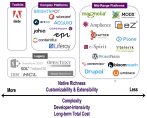Android Tablet or iPad
Google demonstrated Android 3.0 -- a.k.a., Honeycomb -- last week. Honeycomb is a version of their mobile operating system optimized for tablets. It works within a bigger form factor, and also packs in much more power to be able to run videos, games, and other applications better. But that's not the point of this post. I also don't want to get into a flame war between Android and iOS (or Android phones and iPhone), in spite of the post's title. If you are interested in that, you'd need to follow me on twitter.
Regardless of whether Android tablets can compete with iPad, the fact remains that Android has taken operating system out of the equation now. And this has serious implications for site publishers targeting mobile devices.
In earlier days, one of the features that differentiated one mobile phone from another was its operating system. Companies like Nokia and Apple invested huge amount of dollars developing Symbian and iOS. But what Android has done is that it has allowed lesser-known or even unknown vendors to compete with the Nokias and Apples of the world.
It has also opened up a huge potential for companies to target a big mobile population that can now afford a "smart phone" without shelling out a bomb. In several countries in Asia and Europe, mobile phones are expensive because they are not subsidized by wireless service contracts. But with less expensive phones now having the ability to access the web -- and mobile penetration far exceeding PC penetration -- the universe has suddenly expanded.
With opportunities come challenges, especially if your organization is one of those who want to target this population. Unlike iOS where Apple controls the hardware, Android does not have that benefit. Android devices range from small 2" form factors to large 10" form factors. They also vary hugely in capabilities: some run on a 500 MHz processor while others run on more powerful dual core, 1 GHz processors.
You could of course create "apps" for your applications. But that obviously is not a scalable proposition. For one, you don't want to be creating an "app" for everything, and secondly, it is not trivial to create apps for all different operating systems and deal with the intricacies of different "app stores." You will probably need to achieve a balance between an "app" for some scenarios and a web application for remaining scenarios. In any case, if you are not sure, its best to take an incremental approach.
Start with getting your basics right such as by maintaining a strict separation between your content and presentation (and therefore beware of rich text editors). Focus more on standards-based output that can support basic re-purposing with minimal effort. You can then decide whether it make sense to create a native "app" or invest more in a web application to achieve more fine targeting.








